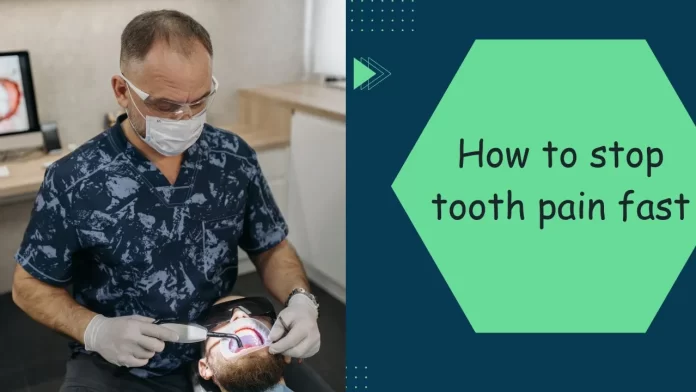Tooth pain can be an incredibly uncomfortable experience, and it’s not always easy to get in to see a dentist right away. Whether you’re dealing with a cavity, an abscess, or some other dental issue, it’s important to take steps to manage your pain as quickly as possible. In this article, we’ll explore how to stop tooth pain fast so you can find relief and get on with your day.
Table of Contents
What causes tooth pain?
Tooth pain can have several underlying causes, and it’s essential to identify the root of the problem to determine the most effective treatment. Some common causes of tooth pain include:
Tooth decay
When bacteria in your mouth produce acids that eat away at your tooth’s enamel, it can cause a cavity. This can lead to tooth sensitivity and pain.
Gum disease
This is an infection of the gums that can cause pain, swelling, and sensitivity in the teeth.
Dental abscess
An abscess is a collection of pus that forms at the root of a tooth, and it can cause severe pain and swelling.
Tooth trauma
If you have experienced trauma to your tooth, such as a chip or fracture, it can cause pain.
Teeth grinding
If you grind your teeth, it can wear down your enamel, leading to tooth sensitivity and pain.
Sinus infection
A sinus infection can cause pressure in your upper teeth and lead to tooth pain.
How to stop tooth pain fast?
If you are experiencing tooth pain and can’t get to a dentist right away, there are several things you can do at home to help manage the pain and find relief. Here are some tips to help stop tooth pain fast:
Over-the-counter pain medication: Taking non-steroidal anti-inflammatory drugs (NSAIDs) such as ibuprofen can help relieve tooth pain and reduce inflammation.
Saltwater rinse: Mix a teaspoon of salt into a glass of warm water and rinse your mouth for 30 seconds before spitting it out. This can help reduce inflammation and provide temporary pain relief.
Cold compress: Apply a cold compress to your cheek near the affected tooth to help numb the area and reduce pain and swelling.
Clove oil: Applying a small amount of clove oil to the affected tooth can provide temporary pain relief due to its natural numbing properties.
Garlic: Chewing on a piece of garlic or applying garlic paste to the affected tooth can help alleviate pain due to its antibacterial and analgesic properties.
How do I know if my tooth pain is serious?
Tooth pain can range from mild discomfort to severe and debilitating pain. It’s important to pay attention to the symptoms you’re experiencing to determine whether your tooth pain is serious and requires immediate attention from a dentist. Here are some signs that your tooth pain may be serious:
- Intense or throbbing pain
If your tooth pain is severe and throbbing, it may indicate an abscess or infection that requires immediate attention.
- Prolonged pain
If your tooth pain lasts for an extended period, it may be a sign of an underlying issue such as decay or nerve damage.
- Pain with pressure
If your tooth pain increases when you bite down or apply pressure to the affected tooth, it may indicate a crack or fracture that requires immediate attention.
- Swelling
Swelling around the affected tooth or in your face and neck can be a sign of an abscess or infection and requires immediate attention.
- Fever or other symptoms
If you are experiencing a fever, headache, or other symptoms in addition to tooth pain, it may indicate a more serious infection that requires immediate attention.
Can a sinus infection cause tooth pain?
Sinus infection can cause tooth pain, especially in the upper teeth. When you have a sinus infection, the sinuses located in your cheekbones, forehead, and nose become inflamed and can cause pressure in the surrounding areas, including your upper teeth. This pressure can lead to tooth pain or sensitivity.
The pain caused by a sinus infection is often described as a dull ache and may be accompanied by other symptoms such as congestion, headaches, and facial pain. If you are experiencing tooth pain along with these symptoms, it’s possible that it is being caused by a sinus infection.
How does a dentist treat tooth pain?
Here are some common ways that a dentist may treat tooth pain:
Filling
If the pain is caused by a cavity or decay, the dentist may fill the affected tooth to prevent further damage and alleviate the pain.
Root canal
If the pain is caused by an infection or damage to the tooth’s pulp, the dentist may perform a root canal to remove the infected or damaged tissue and alleviate the pain.
Extraction
If the tooth is severely damaged or cannot be saved with other treatments, the dentist may need to extract the tooth to alleviate the pain.
Antibiotics
If the pain is caused by an infection, the dentist may prescribe antibiotics to eliminate the infection and alleviate the pain.
Crown
If the pain is caused by a cracked or damaged tooth, the dentist may place a crown on the affected tooth to protect it from further damage and alleviate the pain.
Is it normal to have tooth sensitivity after a filling?
When a dentist places a filling, they remove the decayed portion of the tooth and fill it with a filling material. This can cause temporary sensitivity or discomfort in the tooth. Here are some reasons why you may experience tooth sensitivity after a filling:
Temperature changes
After a filling, you may experience sensitivity to hot and cold temperatures. This sensitivity is usually temporary and should subside within a few days.
Pressure sensitivity
You may experience sensitivity when biting or chewing on the affected tooth. This sensitivity is also usually temporary and should subside within a few days.
Size of the filling
If the filling is large, it can cause sensitivity or discomfort in the tooth. In some cases, the dentist may need to adjust the filling to alleviate the sensitivity.
Nerve irritation
If the filling is placed close to the tooth’s nerve, it can cause sensitivity or discomfort in the tooth. This sensitivity should subside within a few weeks as the tooth heals.
Frequently Asked Questions
Q1: Can tooth pain go away on its own?
Ans: It’s possible, but not recommended to ignore tooth pain. See a dentist to determine the underlying cause.
Q2: What can cause sudden tooth sensitivity?
Ans: Tooth decay, gum disease, teeth grinding, and enamel erosion can cause sudden tooth sensitivity.
Q3: How can I prevent tooth pain?
Ans: Maintaining good oral hygiene, regular dental check-ups, and a healthy diet can prevent tooth pain.
Q4: How long does it take for a toothache to go away?
Ans: It depends on the underlying cause. Tooth pain can last a few days to several weeks.
Q5: Can a cracked tooth cause pain?
Ans: Yes, a cracked tooth can cause pain, especially when biting or chewing. A dentist can recommend appropriate treatment.






















